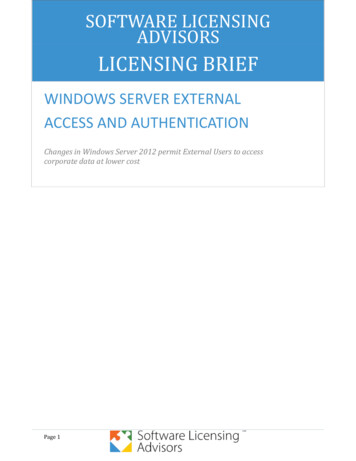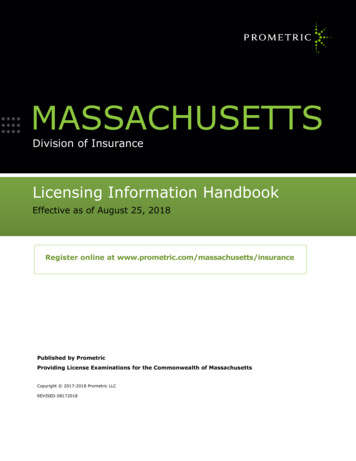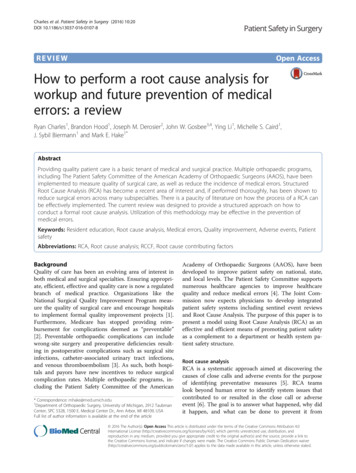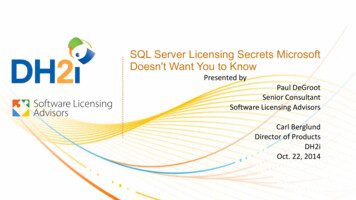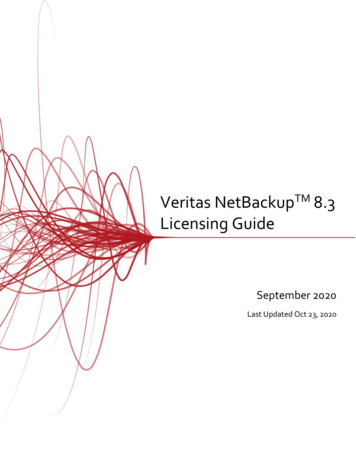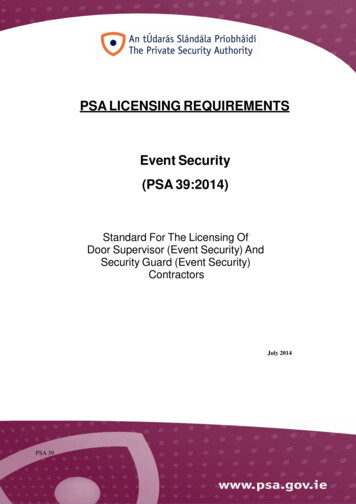
Transcription
PSA LICENSING REQUIREMENTSEvent Security(PSA 39:2014)Standard For The Licensing OfDoor Supervisor (Event Security) AndSecurity Guard (Event Security)ContractorsJuly 2014PSA 39
FOREWORDThis Requirements Document has been developed by the Private SecurityAuthority for the licensing of contractors in the Event Security sector. The1st November 2014 has been set as the critical date for the licensing ofEvent Security. Contractors wishing to provide Event Security servicesfrom that date will require the appropriate PSA licence.Two types of licence are being created with the introduction of licensingto the Event Security sector:Door Supervisor (Event Security)Security Guard (Event Security)The Door Supervisor (Event Security) licence is required by all those whoprovide security services in the Entertainment Area of an event. PSA39:2014 defines the Entertainment Area as the specific area of a venuewhere the entertainment or social performance takes place and where theprovision of a security service is undertaken by a Door Supervisor (EventSecurity) provider. The Entertainment Area includes areas where alcoholand food are served.The Security Guard (Event Security) licence is required by all those whoprovide security services in the Periphery Area of an event. PSA 39:2014defines the Periphery Area as the specific area of a venue adjacent to orin the vicinity of the Entertainment Area where the provision of a securityservice is undertaken by a Security Guard (Event Security) provider. ThePeriphery Area includes car parks, accommodation areas, venueperimeter and approaches, and any other location not within theEntertainment Area.The PSA wishes to thank the many groups and individuals whocontributed to the development of this document including those whoparticipated in the public consultation phase on the draft document. PSA 2014. The PSA is the copyright owner of this document. The document may be reproducedin whole or in part on a not for profit basis once the copyright ownership of the PSA isacknowledged. All other reproduction without the written consent of the PSA is prohibited exceptwhere permitted by law.
isation Information3.6Quotations in pursuance of Contracts or Business3.7Compliance with .54.6Selection and Pre Employment ScreeningTerms of EmploymentCode of ConductIdentificationUniformThreats and ining Policy and ResponsibilityInduction TrainingVenue Related Training/BriefingBasic TrainingTrainers and TrainingSpecialist TrainingRefresher TrainingSupervisory and Management TrainingTraining 6.116.1223232324242425252526Risk AssessmentsEvent Security Staffing RequirementsCommand and Control SystemEvent Security Management PlanEvent ControllerCommand and Control System TrainingIncident ReportingOperations RecordsAssignment InstructionsSecurity of Information and Access MediaVehicles and DriversGeneral7.COMPLIANCE WITH PSA 637Compliance With StandardsPSA Licensing RequirementsANNEX A373739Screening Forms39ANNEX B43RISK ASSESSMENT GUIDELINESANNEX C4353Obligations of Clients of Event Security Contractors353
1.SCOPEThis standard provides a specification for compliance with licensing by thePrivate Security Authority and applies to contractors seeking licences inthe following sectors, Door Supervisor (Event Security) and SecurityGuard (Event Security).It is important to note that this standard only applies to securityproviders subject to PSA licensing, it does not apply to Promoters,Sporting Bodies, Venues or others not subject to licensing by thePSA. However such bodies are required by law to only use PSAlicensed providers for the provision of security services.The Government of Ireland through the Private Security Services Act,2004, established the Private Security Authority as the national regulatoryand licensing body for the private security industry. Amongst the functionsof the Authority are:- The inspection and compliance of persons providing security servicesand maintaining and improving standards in the provision of thoseservices.- Specifying standards to be observed in the provision of security services.- Specifying qualifications or requirements for the granting of licences.Contractors licensed by the Private Security Authority (PSA) and thoseseeking a licence from the PSA must comply with this RequirementsDocument. Only certification bodies approved by the PSA may providecertification services for licensing purposes. Contractors should check thePSA website, www.psa.gov.ie, for a list of approved certification bodies.By applying for and holding a licence, contractors agree to the sharing ofinformation relating to this document, the contents herein and any audit(including audit reports) undertaken for the purposes of PSA licensingbetween the PSA and the contractor’s certification body. Where acontractor fails to comply with the requirements of this document, thecertification body is obliged to notify the PSA.Only the most recent edition of the Requirements Document specified bythe PSA shall apply for licensing purposes. To ascertain the editionapplicable visit the PSA website, www.psa.gov.ie.This document is for the purpose of licensing by the Private SecurityAuthority and should not be interpreted as meeting any other statutoryobligations of a contractor.4
2.DEFINITIONS2.1Ancillary Staff. All security organisation staff not directlyemployed in duties falling within the definition of occupationscovered by this standard who may have access to information of aconfidential nature.2.2Assessment. Test carried out to certify the competence ofall officers.2.3Assignment Instructions. Set of written instructions drawnup by the organisation in agreement with the customer specifyingthe contractual duties.2.4Authorised Certification Body. A certification bodyauthorised by the PSA to provide certification services in respect ofevent security services.2.5Authorised Officials. Personnel of the PSA, CertificationBodies authorised by the PSA or personnel of bodies authorised bystatute to enter the premises of the service provider and requestdocumentation and information pertaining to their official functions.2.6Basic Training. Qualification required by all event securityemployees to meet the mandatory training requirements in respectof PSA licensing.2.7Check-in Call. Routine communication to verify the locationand status of an event security officer on an assignment.2.8Client. Individual or organisation retaining a security servicecovered by this standard to carry out agreed services, responsiblefor remunerating the organisation in accordance with an agreedcontract or other form of oral or written agreement to provide suchservices.2.9Command and Control System. Secure facility whereoperational procedures are monitored and/or managed.2.10 Contract. Document, agreed and signed by both the serviceprovider and the client, setting out the proposed services to besupplied and the details of the quotation, terms, conditions,responsibilities and undertakings.5
2.11 Door Supervisor (Event Security) The provision of any ofthe following functions at, in or in the vicinity of any premises or anyother place where a public or private event or function is takingplace or about to take place –(a) controlling, supervising, regulating or restricting entry tothe premises or place,(b) controlling or monitoring the behaviour of persons thereinfor the purposes of event security,(c) removing persons therefrom because of their behaviour;2.12 Entertainment Area. The specific area of a venue wherethe entertainment or social performance takes place and where theprovision of a security service is undertaken by a Door Supervisor(Event Security) provider. The Entertainment Area includes areaswhere alcohol and food are served.2.13 Event. A gathering of people either at public or privatelocations for entertainment, social performance or other purposese.g. sporting, trade events or social functions, held within temporaryor fixed, indoor and outdoor locations on a regular, occasional oronce off basis. Event Security is the provision of security servicesat such an event.2.14 Event Controller. Representative of the client or venue whohas overall responsibility for the management of the event.Note: Where the client or venue does not provide an EventController this role shall be undertaken by the Event SecurityManager.2.15 Event Guard. A person providing security services as aDoor Supervisor (Event Security) and Security Guard (EventSecurity).2.16 Event Security Manager. The organisation’s representativeresponsible for the overall management and supervision of securityservices reporting directly to the event controller.6
2.17 Event Steward. An individual providing services at an eventwhich are not licensable by the PSA. Such services include:- Checking tickets.- Directing persons to seats, facilities or other areas of avenue during the normal course of an event.- Providing safety advice and assistance.- Ensuring all entrances, exits, passageways, stairway andother concourses are kept clear for health and safetypurposes.- Checking and reporting of any matter posing a risk to thehealth and safety of persons.- Observation and reporting of crowd dynamics.- Traffic management.An Event Steward may not undertake any task of a security nature.Such tasks include but are not limited to:- Preventing unauthorised entry.- Removal of persons from venue.- Protection of property.- Protection of persons (but not including guarding orprotective services provided in relation to a specificindividual or specific individuals).- Searching for and controlling of prohibited goods, itemsor other objects.2.18 Event Supervisor. A person who controls, supervises,regulates, restricts or directs the movements of event security staff,whether in vehicles or otherwise and who is in communication withthe command and control system.2.19 Identity Badge. The official identification card issued by thePSA to each individual employee licence holder to verify his or herlicence status which is to be visibly worn (subject to certainexemptions prescribed by the PSA) by operational security staffwhilst on duty.2.20 Induction (Training). The organisation-specific inductionbriefing session covering organisation structure, ethos, policies andincluding the organisation's and employee's roles andresponsibilities.2.21 Organisation. A limited or unlimited company, a partnershipor sole trader providing services relating to event security for whicha relevant and applicable PSA licence is required.7
2.22 Periphery Area. The specific area of a venue adjacent to orin the vicinity of the Entertainment Area where the provision of asecurity service is undertaken by a Security Guard (Event Security)provider. The Periphery Area includes car parks, accommodationareas, venue perimeter and approaches, and any other location notwithin the Entertainment Area.2.23 Primary Service. The service provided for which theorganisation and the client have agreed remuneration will be paidand a service or services will be provided, all or part of which willcomprise a security service covered by this standard.2.24 Principal (of the organisation). Managing Director, Partner,Majority Owner, authorised member of the Board, Chief FinancialOfficer, Chief Executive Officer or any person authorised, in writing,by any of these persons to enter into contracts or agreements onbehalf of the service provider covered by the provisions andrequirements of this standard.2.25 Private Security Authority (PSA). The regulatory andlicensing authority for the private security industry in the Republic ofIreland.2.26 Qualified Trainer. Means a trainer with the followingminimum qualifications:a) A Level 5 Security Industry Trainer Award, orb) A Level 6 Train the Trainer Award together with a Level 4Minor Award in Guarding Skills or Door Security Proceduresor Security Industry Awareness, orc) A Level 6 Special Purpose Award in Training andDevelopment together with a Level 4 Minor Award inGuarding Skills or Door Security Procedures, ord) A qualification or award which is equivalent to either a), b) orc) above on the National Framework of Qualifications.2.27 Relevant Employment. Employment which involves theprovision of a licensable security service or employment whichinvolves, or may involve, the use, acquisition of, or access to,knowledge of a confidential nature, the improper use of which couldinvolve the organisation, its clients, or any third party, in a securityrisk.2.28 Screening. The selection process and criteria used to checkthe history and background of potential employees to assist theorganisation in its recruitment of new staff covered by this standard.2.29 Screening Period. Period of not less than five years prior tothe date of the application for relevant employment or transfer torelevant employment.8
2.30 Security Guard (Event Security). The provision of patrolsor other protective services in relation to persons or property in anypremises or any other place where a public or private event orfunction is taking place or about to take place, including thecontrolling, supervising, regulating, restricting and directing themovements of persons at an event of function.Note: Security Guard (Event Security) does not include guarding orprotective services provided in relation to a specific individual orspecific individuals.2.31 Training Administrator. Person appointed to supervise andrecord all aspects of training within the organisation.2.32 Venue. Any location where an Event takes place includingservice areas.2.33 Verification. Confirmation by sight and written records heldat the organisation's premises.9
3.ORGANISATION3.1Ownership3.1.1 Except in the case of a plc, ownership and management ofthe service provider shall be clearly stated in writing, and allindividuals having ownership, shareholdings or control of more than5% and the company secretary shall be properly identified.3.1.2 The names of all directors of the organisation shall beestablished and recorded and a record of the results of thescreening of such directors to be held on file and disclosed to anauthorised person on request.3.1.3 Where directors involved in operational activities are alsoemployees of the organisation they shall hold a current PSAemployee licence covering, as a minimum, the primary serviceprovided by the organisation.3.1.4 Details of discharged or undischarged bankruptcy of aprincipal or director of the organisation shall be held on file anddisclosed to the client on request.3.1.5 Where applicable, all principals of the organisation shall signa declaration setting out their beneficial interests in otherorganisations subject to licensing by the PSA.3.1.6 All operational supervisory and management staff shall holda current PSA employee licence in accordance with PSArequirements, for each activity subject to the PSA licensing, carriedout by such staff.3.2Finances3.2.1 The organisation shall ensure that a valid tax clearancecertificate is held on site at the address recorded on the PrivateSecurity Services Licence during the term of the licence.3.2.2 Loans from directors and/or shareholders shall be loancapital, subordinated to all other creditors.3.2.3 Each organisation shall produce and make available onrequest by authorised officials a cash flow statement for the lastaccounting period. For new organisations a cash flow forecast forthe first 12 months of business shall be provided.10
3.3Insurance3.3.1 All insurance shall be relevant to the nature of the businessundertaken. This includes, where the service provided dictates, butis not limited to cover for the following:- Employer liability and public liability- Motor insurance- Deliberate act- Fidelity- Defamation- Efficacy- Loss of keys and consequential loss of keys- Wrongful arrest- Professional indemnity3.4Premises3.4.1 The organisation shall have an administrative office whererecords, together with all professional and business documents,certificates, correspondence and files necessary to the properconduct of business shall be kept in a secure confidential manner.3.4.2 Any administrative office covered by 3.4.1 above shall beprotected by an intruder alarm system installed and maintained inaccordance with prevailing PSA requirements. The organisationshall keep a written record containing the name, address, contactnumber and PSA licence number of the intruder alarm installer aswell as details of the maintenance and service history.3.4.3 The alarm shall be remotely monitored by a PSA licensedAlarm Monitoring Centre. The organisation shall keep a writtenrecord of the name, address, contact number and PSA licencenumber of the alarm monitoring centre providing this service.3.5Organisation Information3.5.1 The organisation shall clearly state its PSA licencenumber(s) for all categories for which it is licensed to provideservices on all organisational letterheads, contracts and advertisingand promotional documents and/or media.3.5.2 Where the provision of a contract is required by a client suchcontract shall include the following minimum provisions in respectof the organisation providing the service:(a) Total costing (including VAT) for the service to be providedand the arrangements for payment.11
(b) Obligations to the client, with references to any specialistadvice to be provided (survey), contracted duties(assignment instructions) and compliance with industrystandards or codes of practice.(c) Agreement on conditions for the use of subcontractors,where applicable.(d) Period of the contract and requirements for its terminationwith specific reference to any exclusions, penalty clauses orother restrictions.(e) Level of response to be provided and the means forreporting and exchanging necessary operational information.(f) Safety statement.(g) Details of complaints procedures and complaintsmanagement procedures(h) The scope of the service to be provided3.5.3 The agreed contract shall be signed by a principal of theorganisation and of the client and a copy retained by each. Wherethe client chooses not to sign or return a contract the organisationshall maintain evidence on file of postage (registered) or e-maildelivery of the contract or general terms and conditions to the clientand any subsequent correspondence.3.5.4 Where the use of subcontractors is provided for under theterms of the contract or agreement, the organisation which is theparty contracted to provide the service to the client shall require thesubcontractor to provide evidence of compliance with prescribedstandard(s), as well as evidence of holding a current valid PSAlicence, before engaging the services of that subcontractor.3.6Quotations in pursuance of Contracts or Business3.6.1 Each organisation shall provide each prospective client with aclear written quotation which shall, if agreed and accepted, formpart of the contract or general terms and conditions.3.6.2 The documented quotation shall include the total cost for theservice and method(s) of payment.3.7Compliance with Legislation3.7.1 The organisation shall have and make available to a client orpotential client a statement signed and dated by a principal of theorganisation, of its compliance with all relevant legislation and shallstate specifically its compliance, where relevant, with the following:- Planning and Development Acts.- Licensing of Indoor Event Acts.- Code of Practice For Safety At Indoor Concerts (Dept. ofthe Environment and Local Government: 1998).12
- Code of Practice For Safety At Outdoor Pop Concerts andOther Outdoor Musical Events (Dept. Of Education: 1996).- Code of Practice For Safety At Sports Grounds (Dept. OfEducation: 1996).- Health, Safety and Welfare at Work Act(s).- Organisation of Working Time Act(s).- Private Security Services Acts.- Taxation and Social Welfare Acts.- Payment of Wages Act.- Immigration Acts.Relevant verification shall be available to all statutory bodies andtheir agents, including but not limited to:- The PSA- National Employment Rights Authority- Authorised Certification Body3.7.2 Notwithstanding the requirements of sub-clause 3.7.1 theorganisation shall, where applicable, hold at its premisesverification of compliance with current legally enforceableagreements or legislation in respect of rates of pay and allassociated conditions.13
4.STAFFING4.1Selection and Pre Employment Screening4.1.1 General4.1.1.1 The organisation shall carry out detailed pre-employmentenquiries to ensure that all personnel are competent and of goodcharacter.4.1.1.2 All persons offered employment by the organisation forposts involving participation in, access to details of, or knowledge ofsecurity duties shall be screened.4.1.1.3 A personnel file shall be established for each personsubject to screening.4.1.1.4 All applicants for relevant employment shall be requiredto provide the following:(a) An acknowledgement, signed and dated by the applicant,that misrepresentation, or failure to disclose material factsmay constitute grounds for dismissal.(b) A signed statement authorising an approach to formeremployers, State institutions, personal referees, etc., forverification of their career and employment record (seeAnnex A, Form 1 for a suggested format).4.1.1.5 No applicant shall be offered relevant employment unlessthey hold a PSA licence and until screening is completed.4.1.1.6 Certified copies of all relevant personnel and screeningdocumentation shall be held on file.4.1.1.7 The requirements in Section 4.1 shall be applied equallyto full-time and to part-time employees and at all levels of seniority,including directors.4.1.1.8 The relevant provisions of these requirements shall applyto all ancillary staff including those employed on a temporary basis.4.1.1.9 The screening period shall not be less than five years orfrom school leaving, whichever is the shorter duration.14
4.1.1.10 Persons employed for security duties as Door Supervisor(Event Security) personnel or Security Guard (Event Security)personnel shall not be less than eighteen years of age.4.1.1.11 Persons employed for security duties as EventSupervisor personnel shall have displayed the competence toundertake the roll of an Event Supervisor.4.1.1.12 Persons beyond sixty-five years of age employed forsecurity duties as Event Supervisor, Door Supervisor (EventSecurity) or Security Guard (Event Security) personnel shall berequired to undergo an annual medical examination to ensure theirfitness for the duties to which they may be assigned.4.1.1.13 Full screening for the period covered under 4.1.1.9 aboveshall apply except in the following circumstances:Screening for a shorter period can be carried out where:a) an employee or director holds a current PSA licence, andb) has, immediately prior to the commencement of thisemployment, been employed by another licensedsecurity provider, andc) the previous employer referred to in b) has carried outthe full screening requirements under a standardaccepted for licensing by the PSA within the precedingfive years and these screening records have (with eachindividual employees consent) been transferred to thecurrent employer by the previous employer.Where a), b) and c) above apply, screening shall be carried outfrom the date the screening by the previous employer had beenconducted until the commencement of this employment.4.1.1.14 Where the provisions of 4.1.1.13 apply, the previousemployer shall, upon receipt of a written request by an immediatelysubsequent employer covered by this standard, forward those partsof the employee’s personnel file relating to details of screening ( butonly with each individual employees consent) and trainingundertaken by the previous employer. Any requested details inrelation to other parts of the personnel file held by the previousemployer shall be released only where the employee givespermission in writing to the previous employer to release suchdetails.15
4.1.2 Pre Employment Interview4.1.2.1 Prior to the interview the applicant shall submit acurriculum vitae or other documentation containing:(a) A list of the applicant's previous employers along withdates worked for each employer.(b) Contact details for previous employers listed(c) Periods of unemployment(d) Applicant's current place of residence(e) Periods of education4.1.2.2 A personal interview of a duration sufficient to assess thefollowing shall be conducted by the organisation:(a) The general ability of the applicant and the generaldemeanour of the applicant.(b) Verification of personal documents e.g. birth certificate,driving licence, passport, service records, current securityLicence, work visa etc.(c) The applicant’s previous employment history andexperience, including reason(s) for leaving previousemployments(d) The level of occupational fluency in respect of reading,writing and oral communication in the English language.(e) The applicant’s experience, if any, in providing a securityservice.4.1.2.3 Interview notes evidencing that the requirements set outin 4.1.2.2 above have been addressed shall be taken by theorganisation and retained on the personnel file of the applicant.4.1.3 Character and Other References4.1.3.1 Screening procedures shall include direct reference toformer employers, educational authorities, etc., with confirmation bythem, in writing, of periods of employment contributing to acontinuous record of the career or history of the person beingscreened for the whole of the screening period, on a month-tomonth basis. The direct reference shall include at least twoattempts, in writing, by the organisation to obtain the continuousrecord referred to in this requirement.4.1.3.2 Where initial references in respect of screening are takenby telephone the following procedures shall be used:(a) Information given on the telephone by a referee shall benoted at the time of making the telephone call and shallbe signed and dated by the member of staff making thetelephone call and retained on the individuals screening16
file (see Annex A, Forms 2 for a suggested format).(b) A written request for written confirmation of theinformation given by telephone shall be forwarded to thereferee within two working days of the telephone callbeing made (see Annex A, Form 3 for a suggestedformat).(c) The screening process shall not be regarded as completeuntil written evidence is obtained (this includes at leasttwo attempts, in writing, required under 4.1.3.1 above).(d) The progress sheet shall be used to monitor and recordthe action taken (see Annex A, Form 4 for a suggestedformat).4.1.3.3 Only documents from third parties such as employers,colleges, Department of Social Protection, solicitors, accountantsare acceptable for screening purposes.Note. For the purposes of this document CVs or other personaldocuments are not acceptable as evidence of screening.4.1.3.4 Subject to satisfactory screening and the provisions of4.1.1.5, all applicants for employment on operational duties shall beoffered employment only when they have completed aquestionnaire relating to their medical history and present generalhealth.4.1.4 Evidence of Qualifications/Awards4.1.4.1 Prior to commencement of employment the organisationshall ensure that the applicant has any qualifications or awardsnecessary for the duties to which the applicant will be employed.Where an applicant holds a PSA licence this shall stand asevidence of the applicant having achieved the awards necessaryfor obtaining the licence.4.1.5 Work Permits, Authorisations and Permissions4.1.5.1 The organisation shall ensure that all necessarydocumentation for work visa applications and permissions/authorityto work is fully completed before the individual is employed. Thisapplies to renewal of such applications also.4.1.5.2 The organisation shall maintain a register of allemployees who have applied for and obtained permission orauthorisation from the State to work in Ireland. The organisationshall review the validity of these permissions or authorisations atleast every 6 months and shall keep a documented record of suchreviews.17
4.1.6 Maintenance and Retention of Records4.1.6.1 The basic details of the employee, covering verifiablehistory within the industry, dates employed, positions held,disciplinary offences and a comment on suitability for employmentin the security industry shall be retained for not less than five yearsfrom the date the employment ceases. This information shall beverifiable in the form of readily retrievable records at the companypremises.4.1.6.2 All records covered by 4.1.6.1 above shall be kept safeand secure against unauthorised access to, or alteration, disclosureor destruction of the data and against their accidental loss ordestruction. Employers shall ensure that the records are retained inaccordance with the recommendations of the Office of the DataProtection Commissioner.4.1.6.3 A list of all personnel currently employed both on apermanent and a provisional basis shall be maintained, and in thecase of those employed on a provisional basis, giving the dates onwhich provisional employment commenced and is to cease for eachindividual.4.1.7 Screening and Acquired Companies4.1.7.1 Where it cannot be established by the records of anacquired organisation that screening to the required standard hasalready occurred, then this shall take place within a period notexceeding thirteen weeks from the date of acquisition.4.2Terms of Employment4.2.1 All employees shall receive a clear, concise andunambiguous contract of employment and a staff handbook.4.2.2 In addition to any mandatory requirements, terms ofemployment shall include the following information:(a) Job title.(b) Effective start date.(c) Probationary period (if
Controller this role shall be undertaken by the Event Security Manager. 2.15 Event Guard. A person providing security services as a Door Supervisor (Event Security) and Security Guard (Event . An Event Steward may not undertake any task of a security nature. Such tasks include but are not limited to: - Preventing unauthorised entry. - Removal .

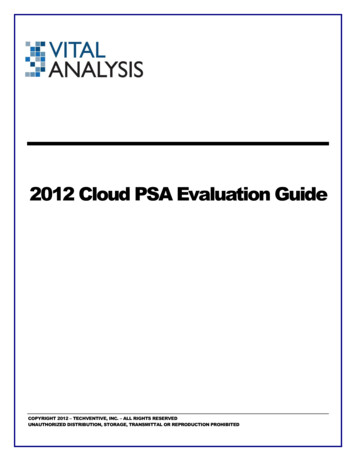
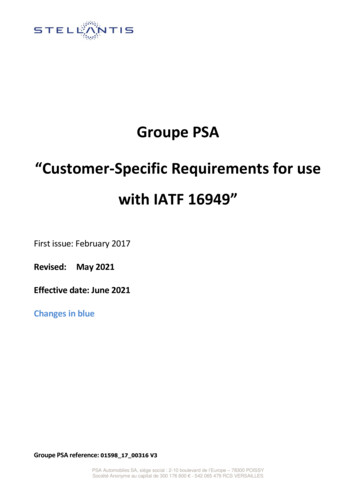
![Profile E01 PSA Width: 0.070 [1.8] inches [mm] Rectangle](/img/42/e01-to-e11-3.jpg)
